实验3:OpenFlow协议分析实践
实验3:OpenFlow协议分析实践
目录
目录
一、基本要求
1、搭建拓扑
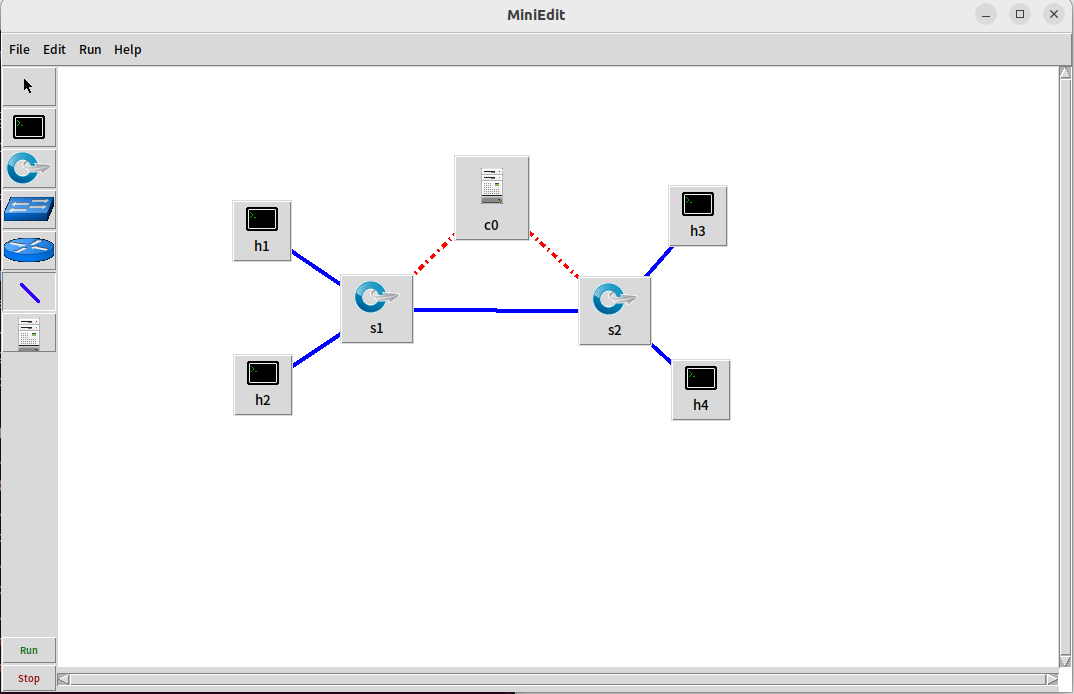
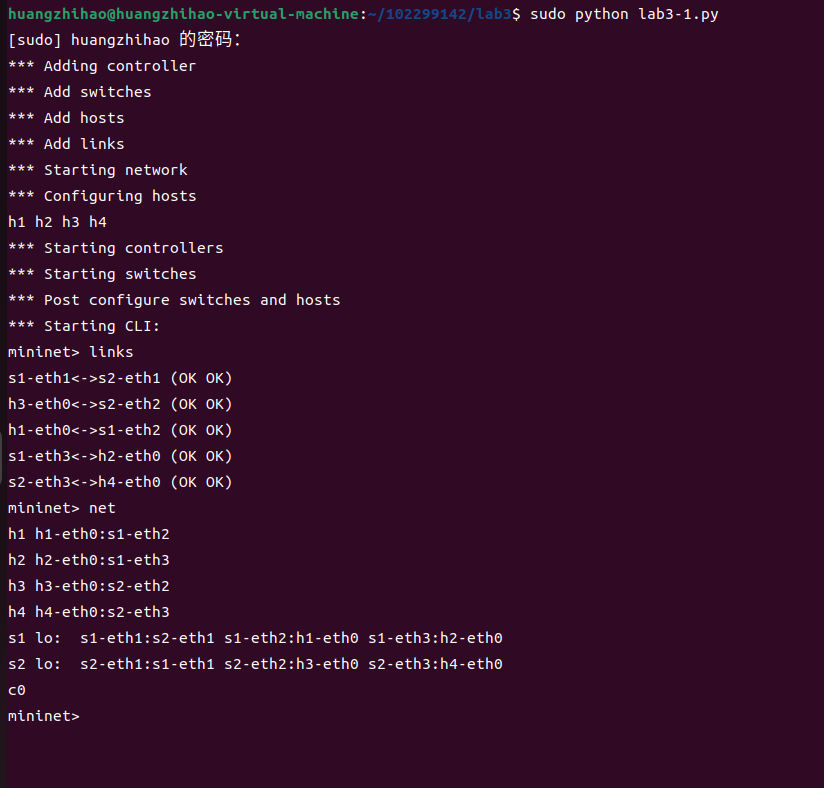
2、抓包结果
HELLO
控制器6633端口---> 交换机42378端口
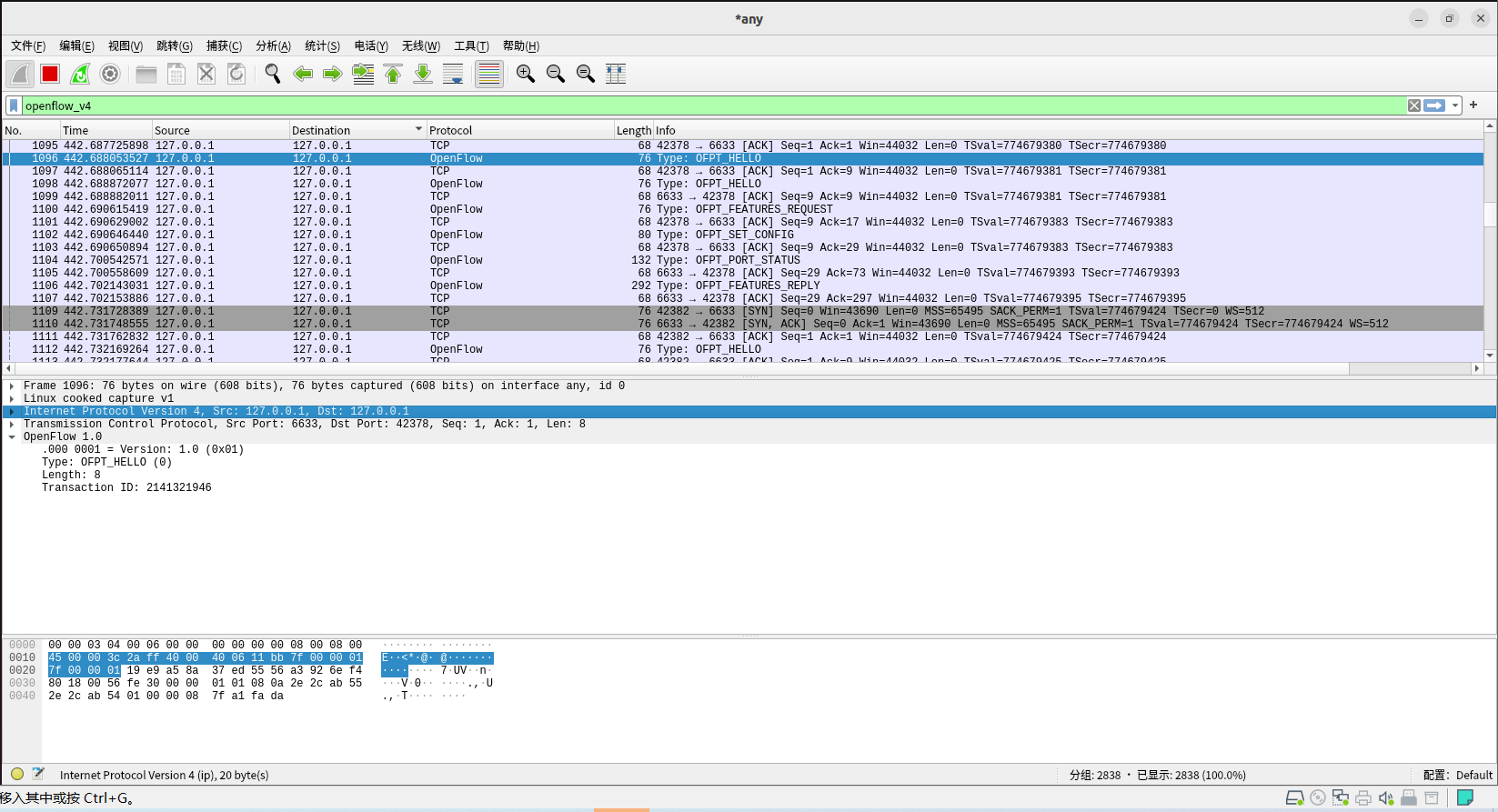
交换机42378端口---> 控制器6633端口
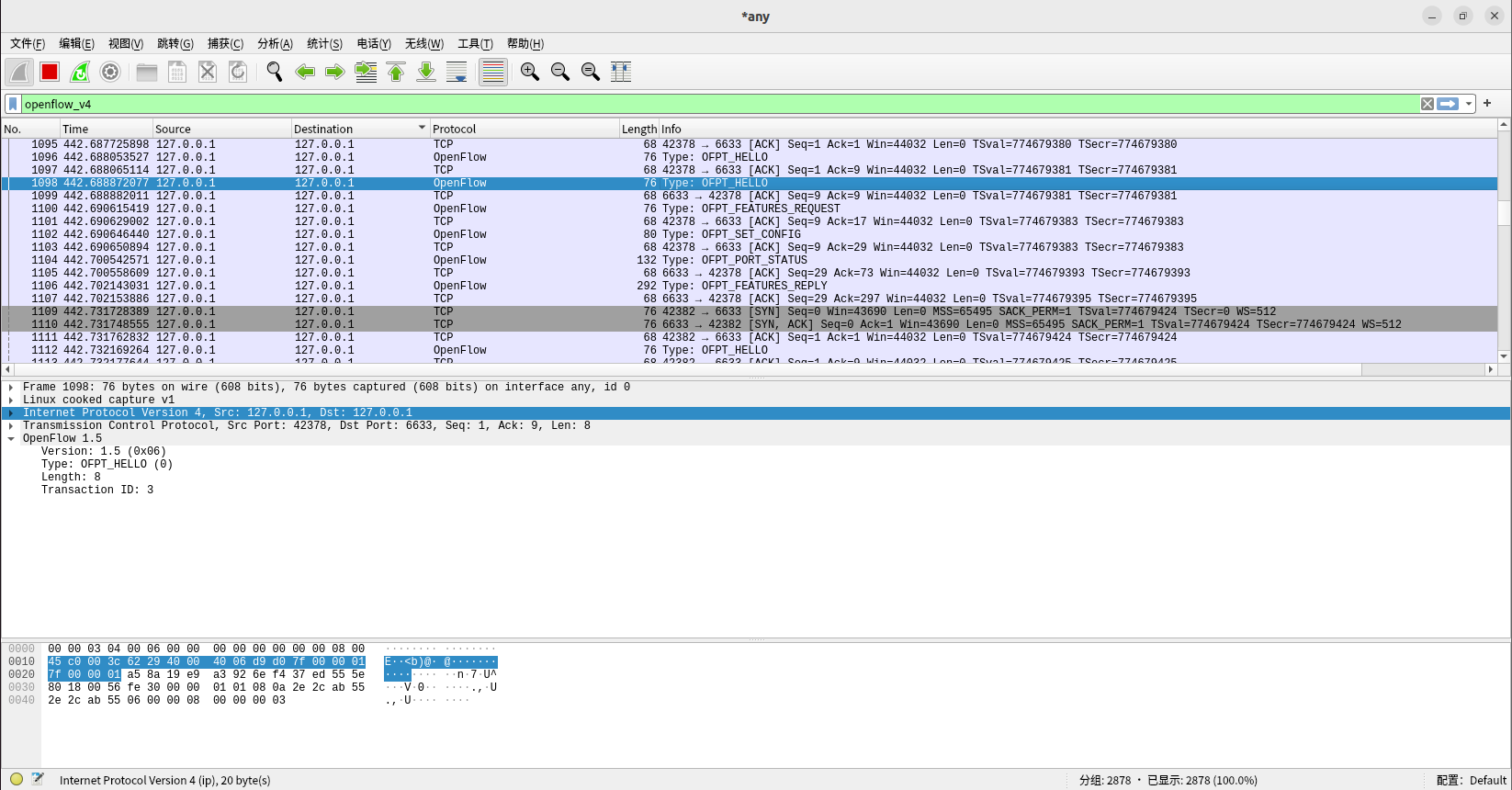
双方建立连接,并使用OpenFlow 1.0
FEATURES_REQUEST
控制器6633端口---> 交换机42378端口
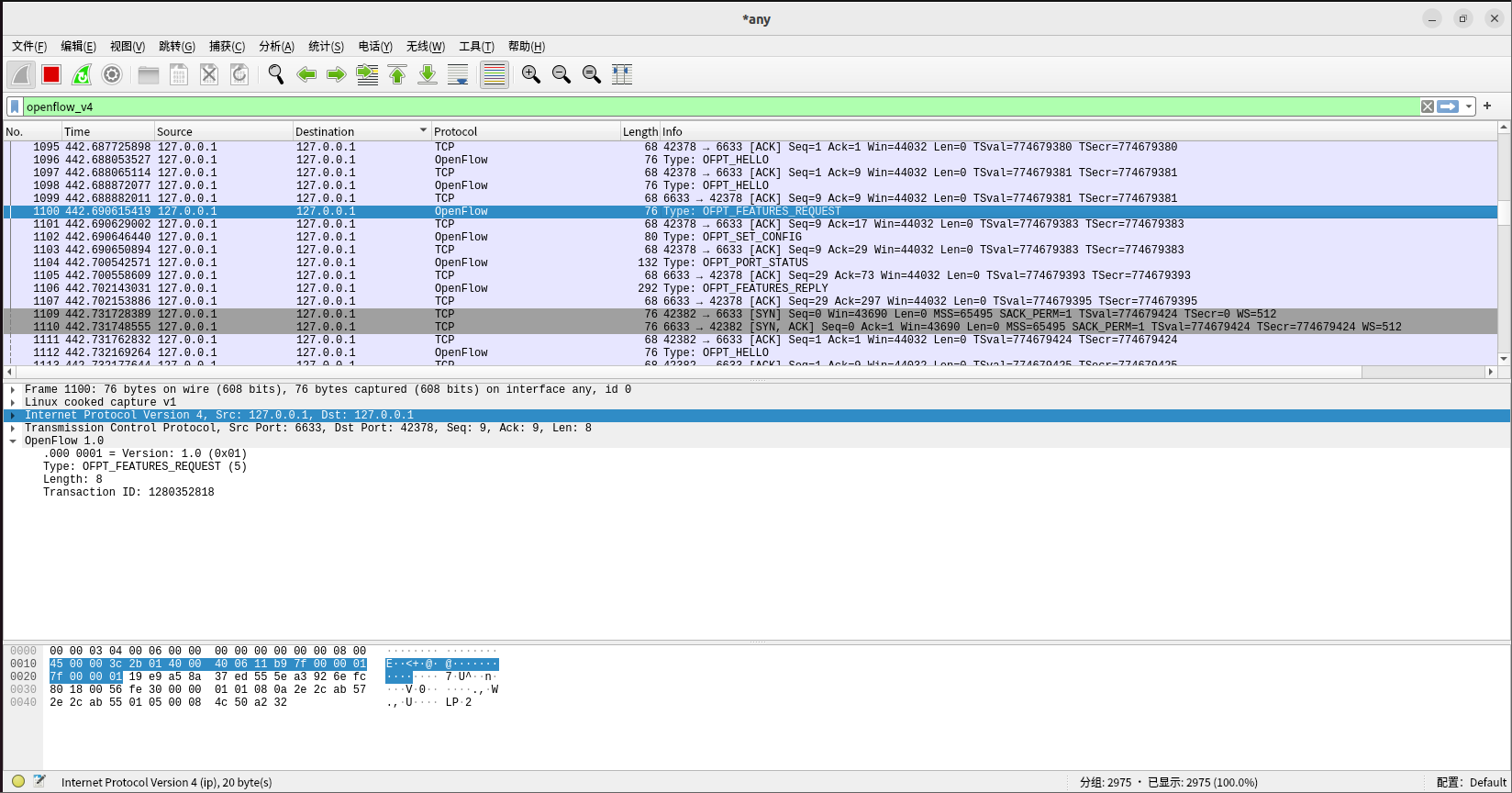
SET_CONFIG
控制器6633端口---> 交换机42378端口
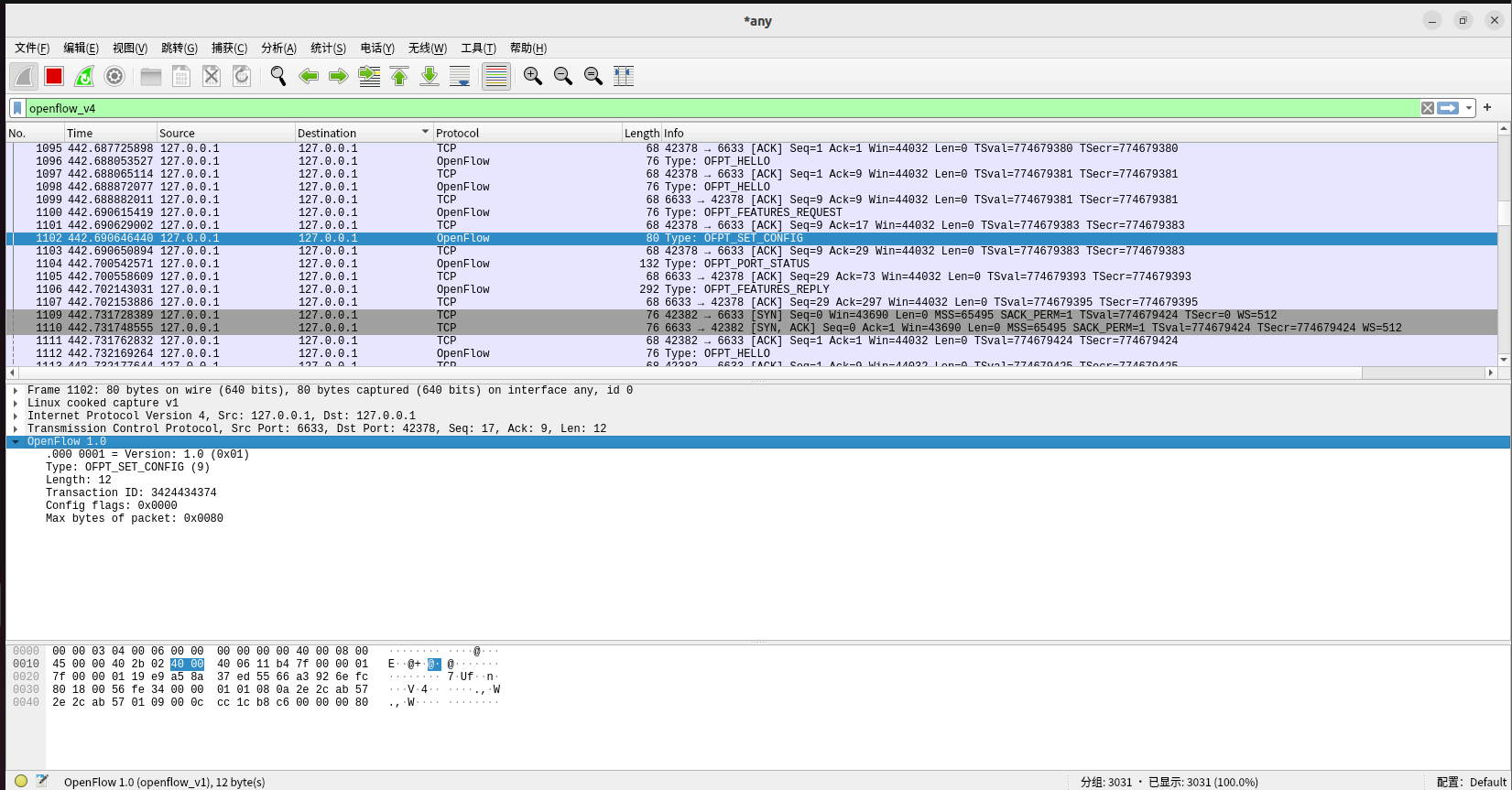
PORT_STATUS
交换机42378端口---> 控制器6633端口
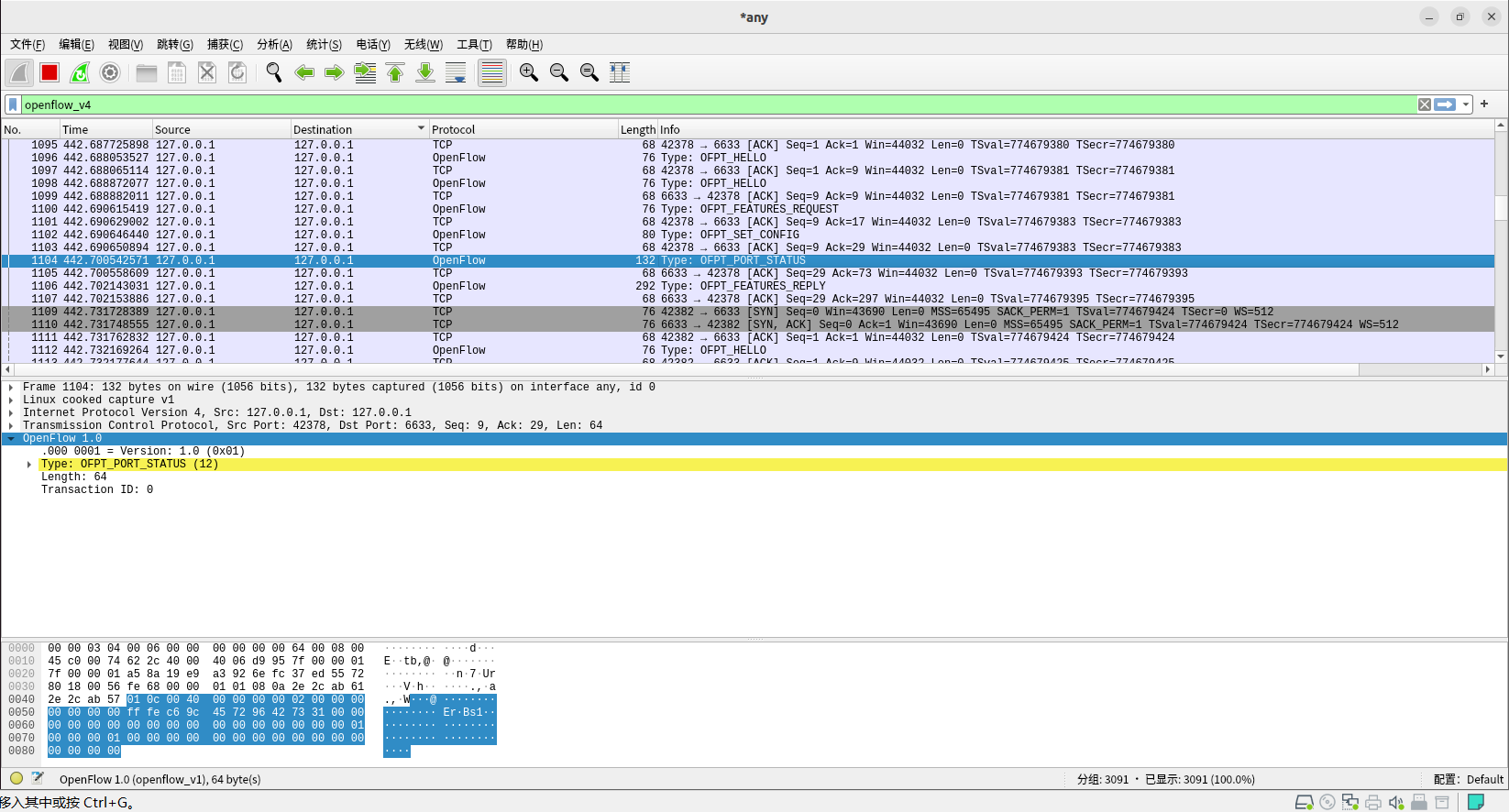
FEATURES_REPLY
交换机42378端口---> 控制器6633端口
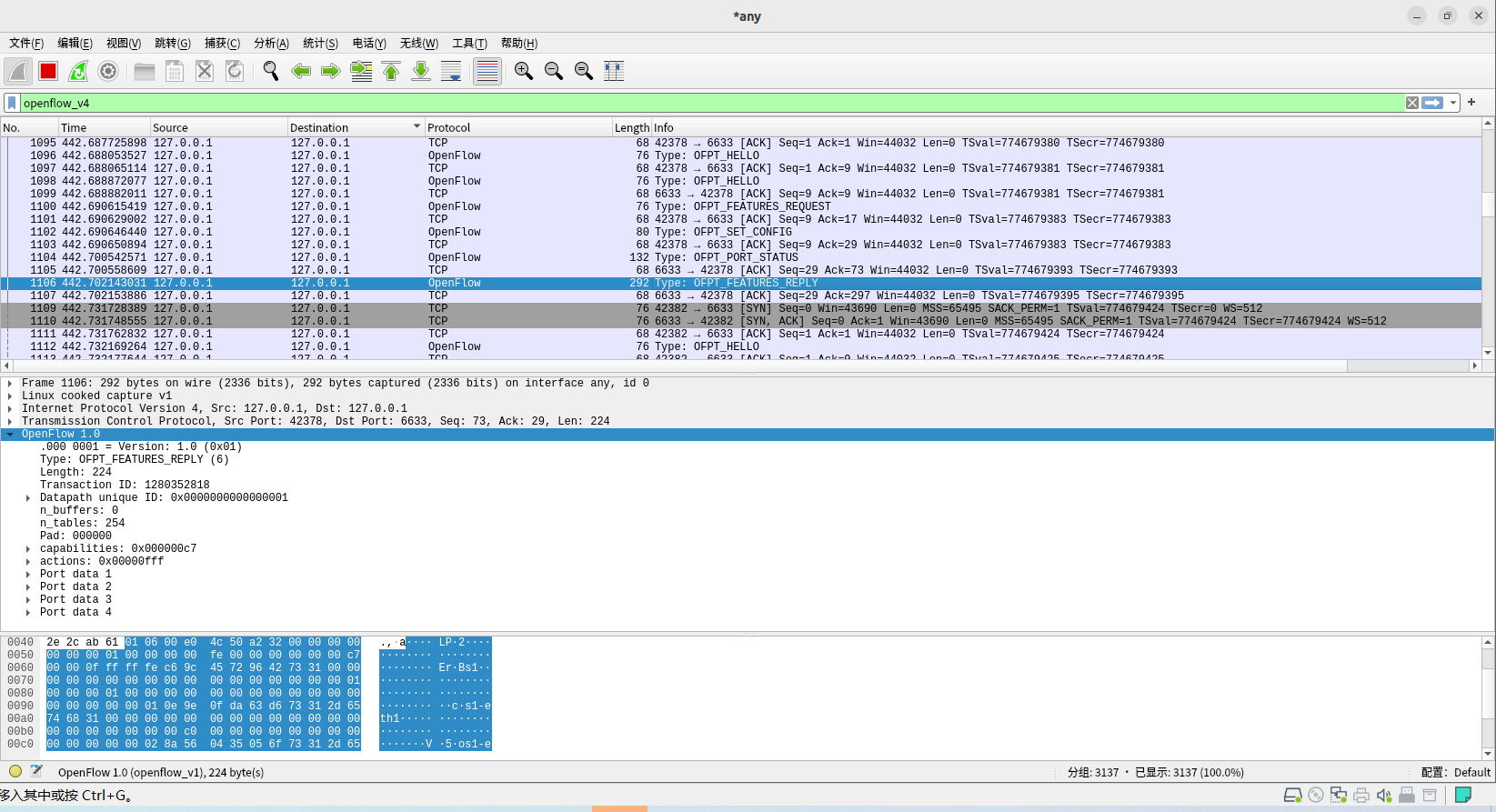
PACKET_IN
交换机42378端口---> 控制器6633端口
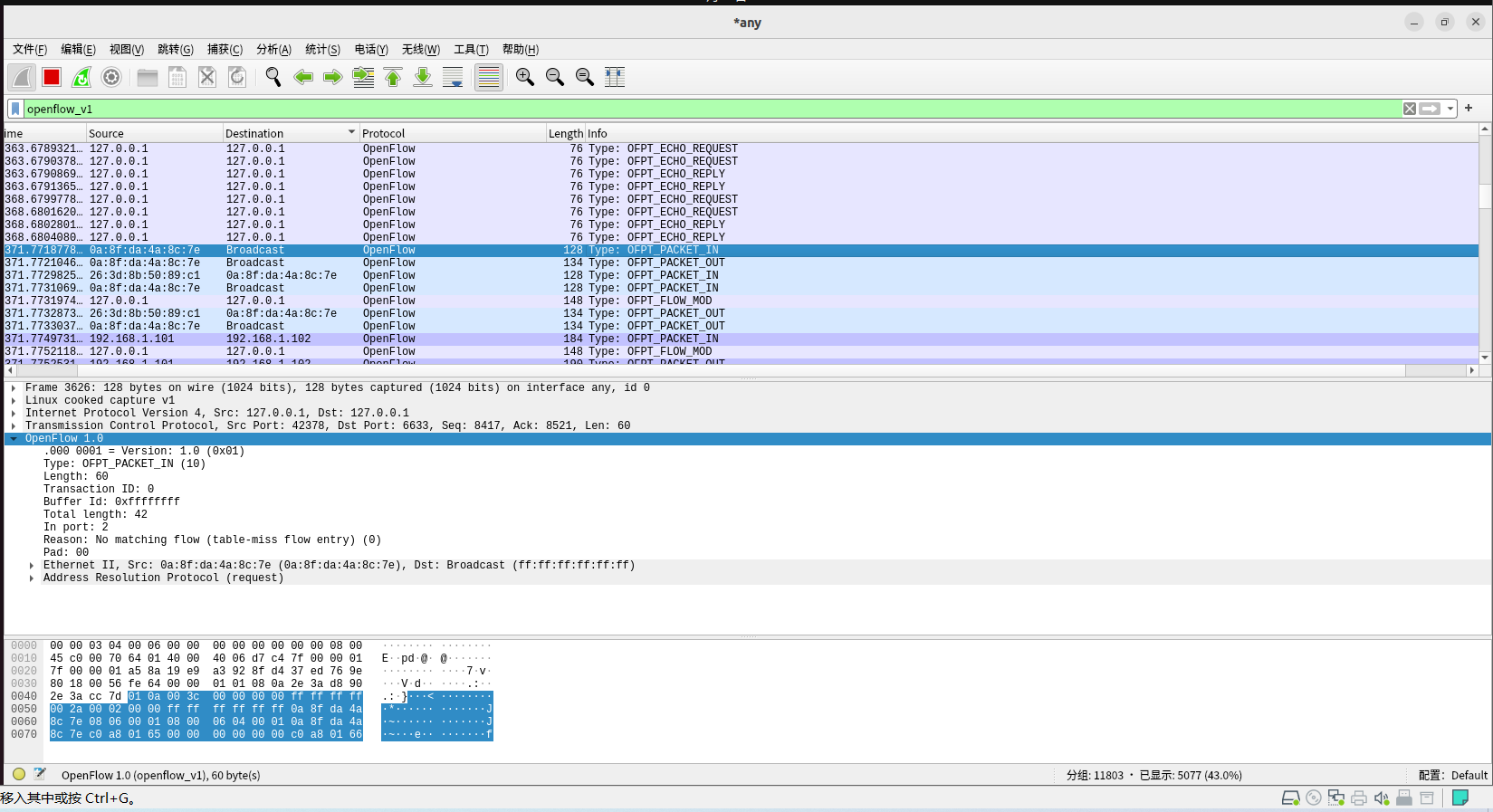
Flow_mod
控制器6633端口---> 交换机42378端口

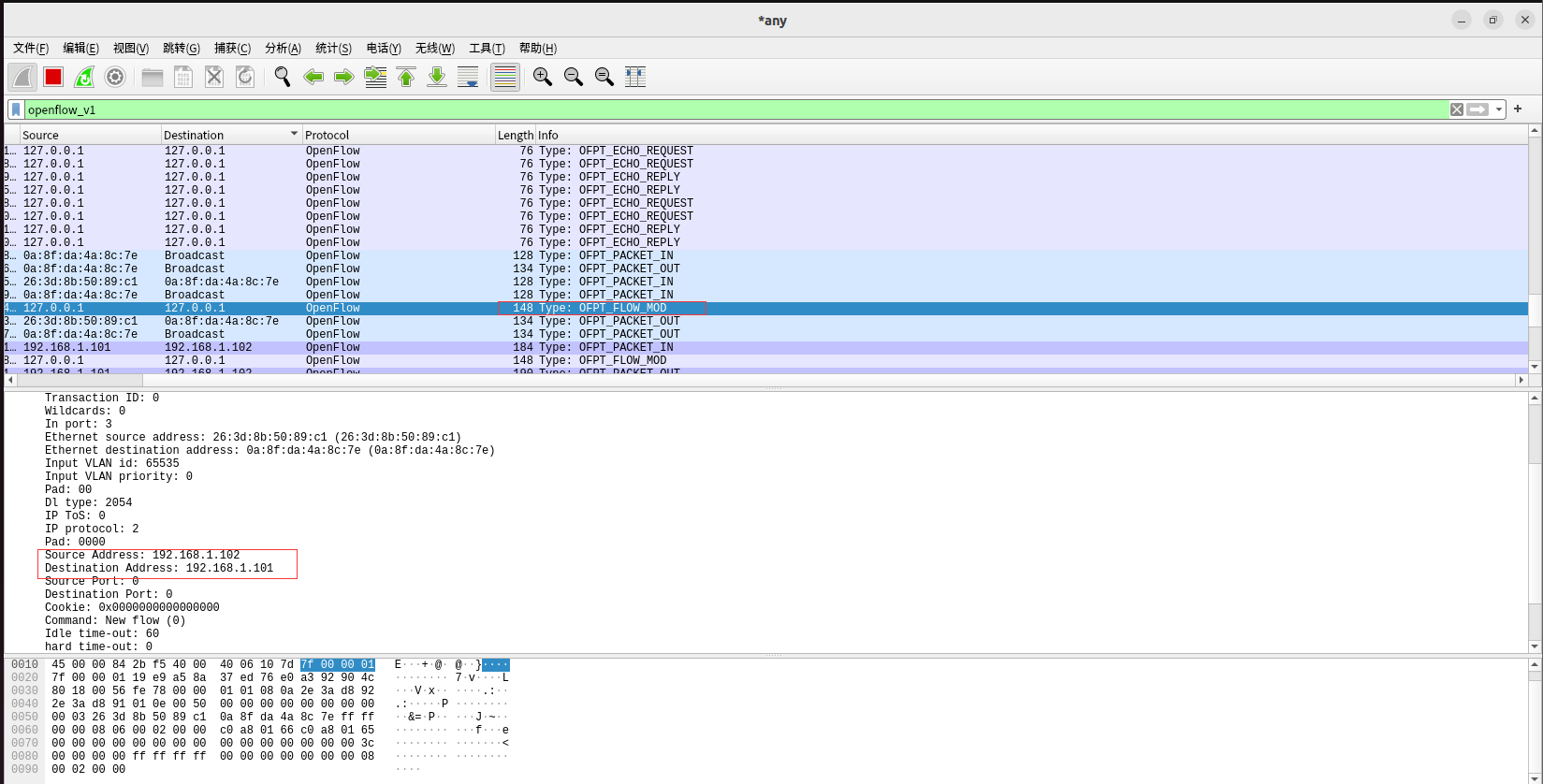
PACKET_OUT
控制器6633端口---> 交换机42378端口
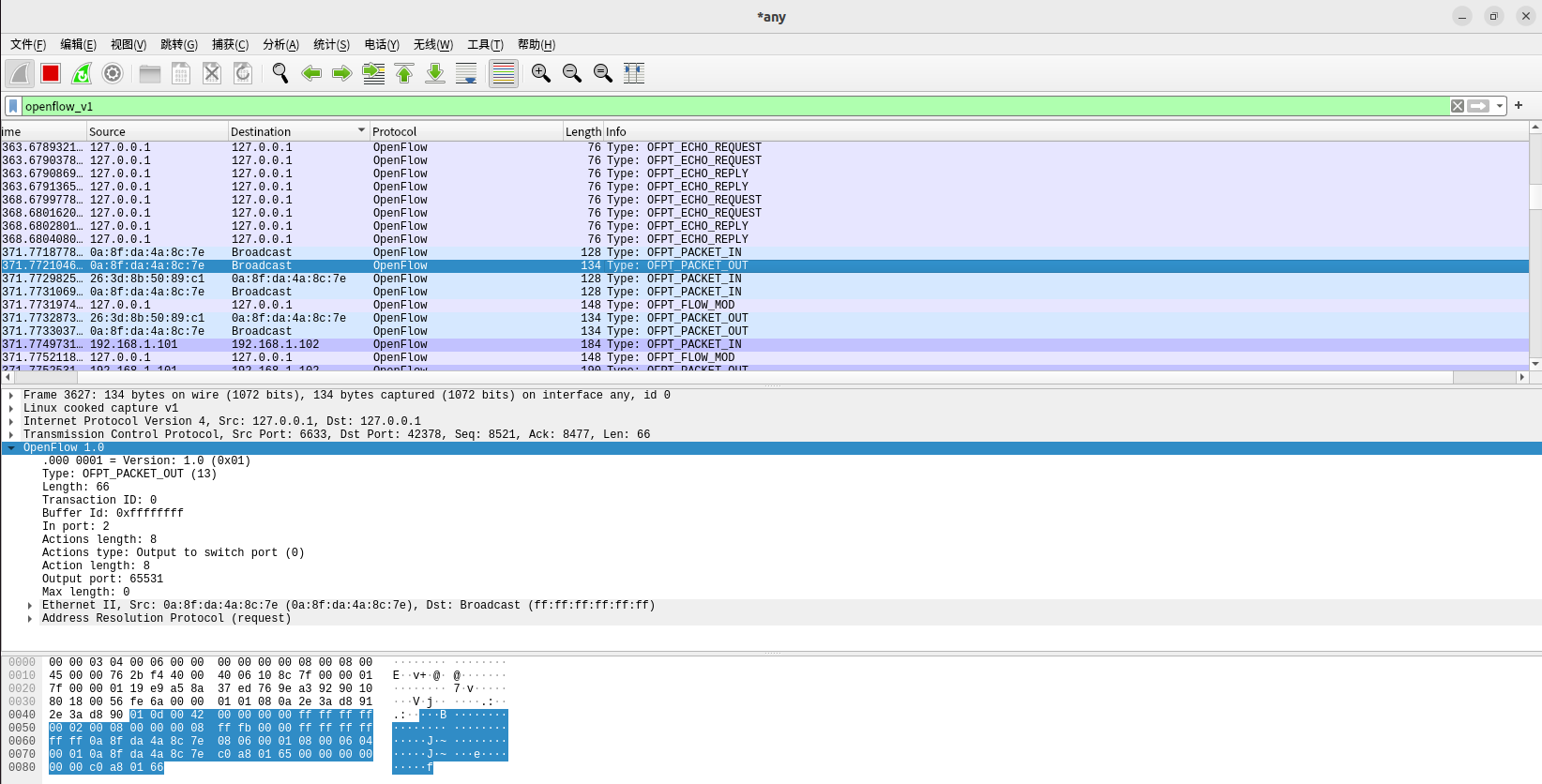
交互图
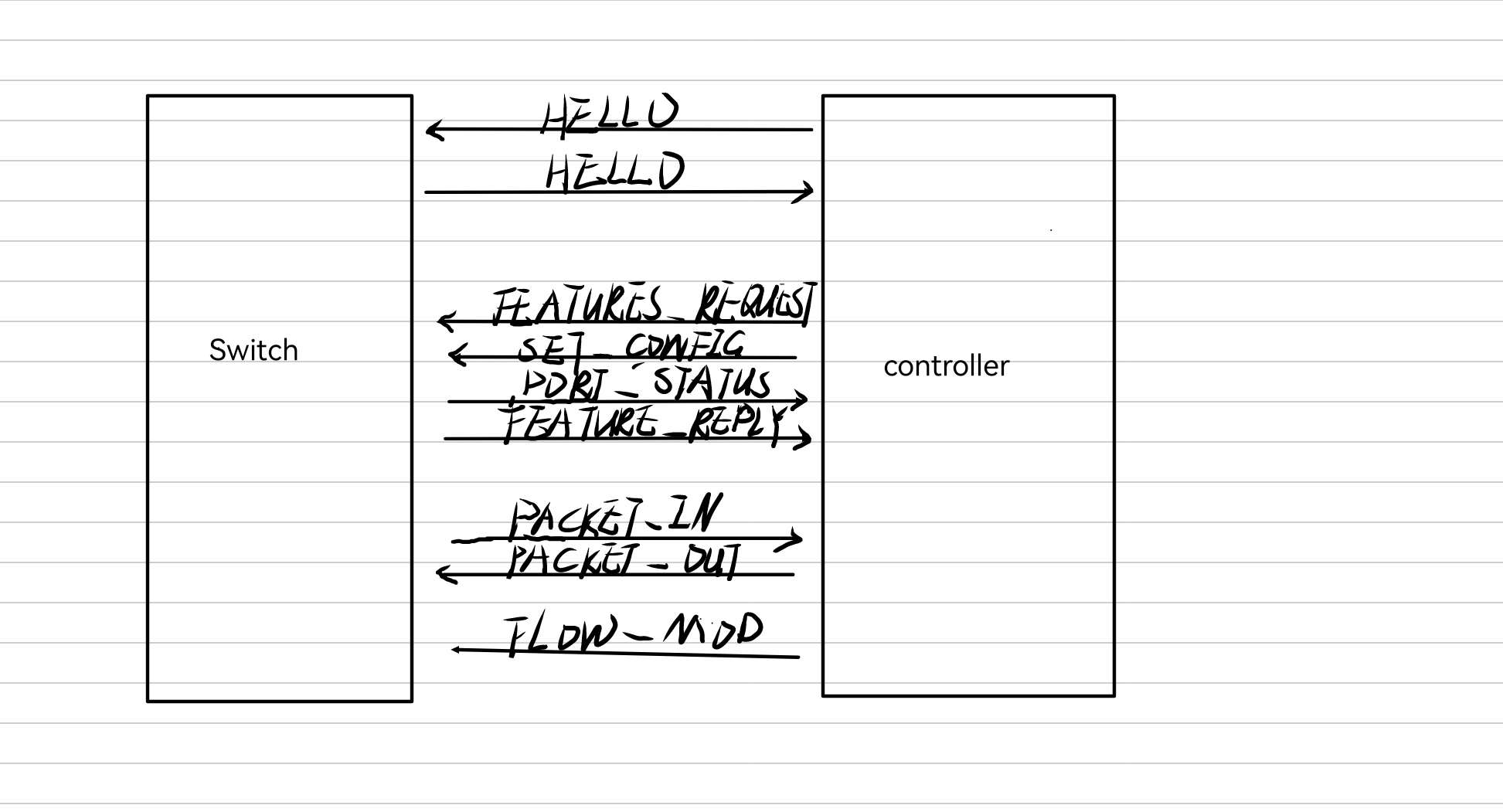
3、回答问题
交换机与控制器建立通信时是使用TCP协议
二、进阶要求
OpenFlow源码数据结构
HELLO
struct ofp_header {
uint8_t version; /* OFP_VERSION. */
uint8_t type; /* One of the OFPT_ constants. */
uint16_t length; /* Length including this ofp_header. */
uint32_t xid; /* Transaction id associated with this packet.
Replies use the same id as was in the request
to facilitate pairing. */
};
struct ofp_hello {
struct ofp_header header;
};
FEATURES_REQUEST
struct ofp_header {
uint8_t version; /* OFP_VERSION. */
uint8_t type; /* One of the OFPT_ constants. */
uint16_t length; /* Length including this ofp_header. */
uint32_t xid; /* Transaction id associated with this packet.
Replies use the same id as was in the request
to facilitate pairing. */
};
struct ofp_hello {
struct ofp_header header;
};
SET_CONFIG
/* Switch configuration. */
struct ofp_switch_config {
struct ofp_header header;
uint16_t flags; /* OFPC_* flags. */
uint16_t miss_send_len; /* Max bytes of new flow that datapath should
send to the controller. */
};
PORT_STATUS
/* A physical port has changed in the datapath */
struct ofp_port_status {
struct ofp_header header;
uint8_t reason; /* One of OFPPR_*. */
uint8_t pad[7]; /* Align to 64-bits. */
struct ofp_phy_port desc;
};
FEATURES_REPLY
struct ofp_switch_features {
struct ofp_header header;
uint64_t datapath_id; /* Datapath unique ID. The lower 48-bits are for
a MAC address, while the upper 16-bits are
implementer-defined. */
uint32_t n_buffers; /* Max packets buffered at once. */
uint8_t n_tables; /* Number of tables supported by datapath. */
uint8_t pad[3]; /* Align to 64-bits. */
/* Features. */
uint32_t capabilities; /* Bitmap of support "ofp_capabilities". */
uint32_t actions; /* Bitmap of supported "ofp_action_type"s. */
/* Port info.*/
struct ofp_phy_port ports[0]; /* Port definitions. The number of ports
is inferred from the length field in
the header. */
};
/* Description of a physical port */
struct ofp_phy_port {
uint16_t port_no;
uint8_t hw_addr[OFP_ETH_ALEN];
char name[OFP_MAX_PORT_NAME_LEN]; /* Null-terminated */
uint32_t config; /* Bitmap of OFPPC_* flags. */
uint32_t state; /* Bitmap of OFPPS_* flags. */
/* Bitmaps of OFPPF_* that describe features. All bits zeroed if
* unsupported or unavailable. */
uint32_t curr; /* Current features. */
uint32_t advertised; /* Features being advertised by the port. */
uint32_t supported; /* Features supported by the port. */
uint32_t peer; /* Features advertised by peer. */
};
PACKET_IN
/* Why is this packet being sent to the controller? */
enum ofp_packet_in_reason {
OFPR_NO_MATCH, /* No matching flow. */
OFPR_ACTION /* Action explicitly output to controller. */
};
/* Packet received on port (datapath -> controller). */
struct ofp_packet_in {
struct ofp_header header;
uint32_t buffer_id; /* ID assigned by datapath. */
uint16_t total_len; /* Full length of frame. */
uint16_t in_port; /* Port on which frame was received. */
uint8_t reason; /* Reason packet is being sent (one of OFPR_*) */
uint8_t pad;
uint8_t data[0]; /* Ethernet frame, halfway through 32-bit word,
so the IP header is 32-bit aligned. The
amount of data is inferred from the length
field in the header. Because of padding,
offsetof(struct ofp_packet_in, data) ==
sizeof(struct ofp_packet_in) - 2. */
};
Flow_mod
struct ofp_flow_mod {
struct ofp_header header;
struct ofp_match match; /* Fields to match */
uint64_t cookie; /* Opaque controller-issued identifier. */
/* Flow actions. */
uint16_t command; /* One of OFPFC_*. */
uint16_t idle_timeout; /* Idle time before discarding (seconds). */
uint16_t hard_timeout; /* Max time before discarding (seconds). */
uint16_t priority; /* Priority level of flow entry. */
uint32_t buffer_id; /* Buffered packet to apply to (or -1).
Not meaningful for OFPFC_DELETE*. */
uint16_t out_port; /* For OFPFC_DELETE* commands, require
matching entries to include this as an
output port. A value of OFPP_NONE
indicates no restriction. */
uint16_t flags; /* One of OFPFF_*. */
struct ofp_action_header actions[0]; /* The action length is inferred
from the length field in the
header. */
};
struct ofp_action_header {
uint16_t type; /* One of OFPAT_*. */
uint16_t len; /* Length of action, including this
header. This is the length of action,
including any padding to make it
64-bit aligned. */
uint8_t pad[4];
};
PACKET_OUT
* Send packet (controller -> datapath). */
struct ofp_packet_out {
struct ofp_header header;
uint32_t buffer_id; /* ID assigned by datapath (-1 if none). */
uint16_t in_port; /* Packet's input port (OFPP_NONE if none). */
uint16_t actions_len; /* Size of action array in bytes. */
struct ofp_action_header actions[0]; /* Actions. */
/* uint8_t data[0]; */ /* Packet data. The length is inferred
from the length field in the header.
(Only meaningful if buffer_id == -1.) */
};
三、个人感想
本次实验学习分析openflow协议,基本上了解学习了openflow协议的工作方式以及发包流程,并且学习了这些协议的源代码数据结构,进一步加强了对openflow协议工作方式以及工作流程的理解了,了解了在这个协议之下交换机以及控制器进行交流分享数据的方式,对数据交互有了更深的理解。
同时,在刚开始使用wireshark抓包时发现无法看到hello协议的包,才了解到hello在构建拓扑结构的时候才会发出。之后又找不到flow_mod的包,了解到flow_mod在下发流表的时候才会发出,对发到的顺序以及控制器与交换机之间的沟通顺序有了更深刻的理解。
posted on 2022-09-28 12:35 jode-hirons 阅读(27) 评论(0) 编辑 收藏 举报



